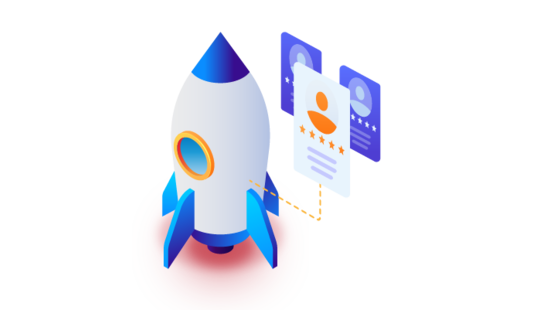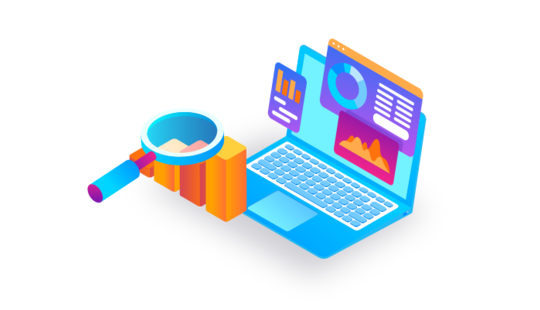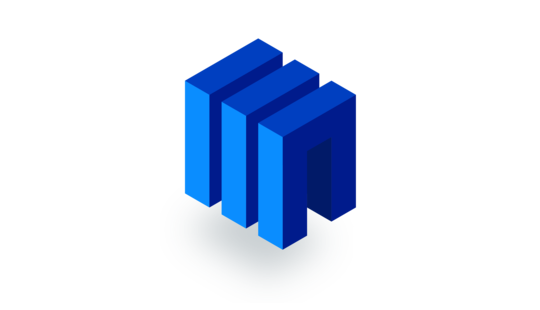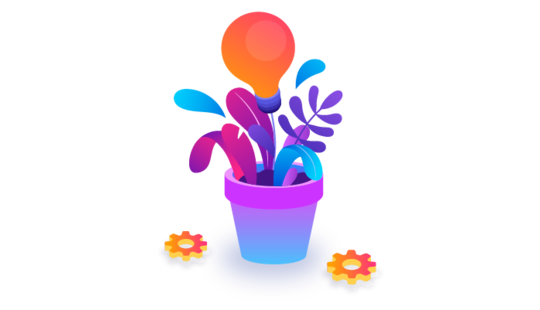-
Product Management
Software Testing
Technology Consulting
-
Multi-Vendor Marketplace
Online StoreCreate an online store with unique design and features at minimal cost using our MarketAge solutionCustom MarketplaceGet a unique, scalable, and cost-effective online marketplace with minimum time to marketTelemedicine SoftwareGet a cost-efficient, HIPAA-compliant telemedicine solution tailored to your facility's requirementsChat AppGet a customizable chat solution to connect users across multiple apps and platformsCustom Booking SystemImprove your business operations and expand to new markets with our appointment booking solutionVideo ConferencingAdjust our video conferencing solution for your business needsFor EnterpriseScale, automate, and improve business processes in your enterprise with our custom software solutionsFor StartupsTurn your startup ideas into viable, value-driven, and commercially successful software solutions -
-
- Case Studies
- Blog
Startup Roles and Responsibilities: Key Positions in a Tech Startup
A startup can only be successful as a team. However, there’s often confusion about the roles and responsibilities of different team members.
We’ll list the key positions in a startup company, describe the responsibilities of those who hold these positions, and list the skills they need to successfully perform their jobs.
1. Product manager position
Position overview
The product manager is the chief product advocate. Their primary tasks are customer development and product development.
In a startup, the role of product manager is often taken on by the CEO.
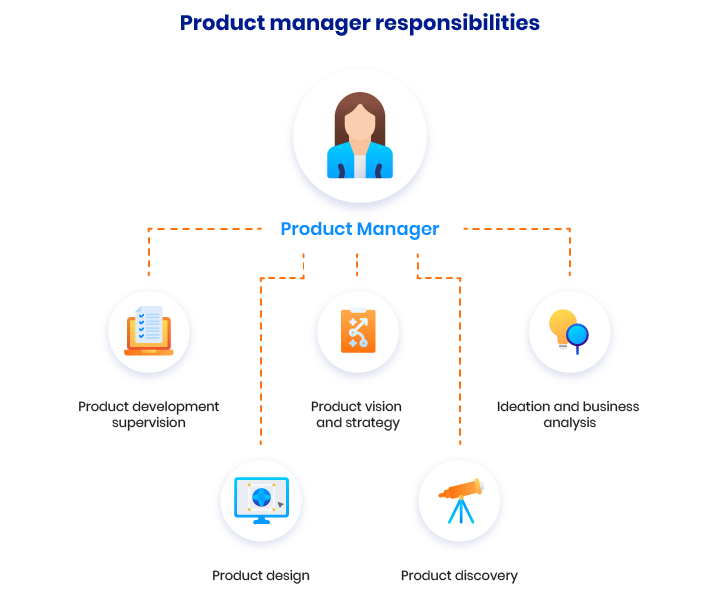
Create a product vision and strategy
In a startup, it’s the product manager who is in charge of strategic questions throughout the product development process. In particular, they:
- Define the product vision
- Build and implement the product strategy
Perform product discovery
The product manager’s goal is to state the problem the startup’s product will solve and define the target audience in need of the startup’s solution. In order to do this, they:
- Create a business model
- Perform market analysis, competitor analysis, and target audience analysis
- Define a solution concept
- Compose a product feature set
- Estimate the project budget
- Set up the team
- Create a project schedule baseline
- Define the MVP scope
Carry out ideation and business analysis
Ideation and business analysis is a process that repeats from release to release. The primary goal of the product manager is to establish the scope of each release. For this, the product manager:
- Collects, reviews, and prioritizes hypotheses
- Defines the feature concept
- Performs release roadmapping
- Grooms and assigns tasks
Design the product and approve the design
The product manager transforms a product from vision to scaled and constructed solution. Their goal is to:
- Define, manage, and prioritize product requirements (both business and functional)
- Perform product data modeling
- Approve the UI/UX design (The product manager is accountable for the final UI/UX solution.)
Supervise product development
The PM makes sure the product is built according to the vision and strategy as well as the functional, non-functional, and business requirements. Their task is to supervise the software development process, including server- and client-side app development, infrastructure management, and DevOps.
Key product manager hard skills
Since product manager is a multifunctional role, a product manager should have knowledge of and expertise in:
- Defining product strategies. The product manager should be able to define the product’s vision and strategy, analyze the target audience, and explore the competition.
- Creating business models and strategic management. The product manager should be able to define customer segments, the product’s value proposition, communication channels, customer relationships, revenue streams, key partners, key activities, key resources, and the business cost structure.
- Customer development. Product managers should perform customer discovery, customer validation, customer creation, and company building.
- Software development fundamentals. A product manager should know the basics of building infrastructure, architectures, SDLC, and tech stacks.
- Requirements engineering. A product manager should be able to create business, functional and non-functional requirements.
- Data modeling and interpretation. A product manager should be able to develop a data model that includes an entity relationship diagram (ERD) and a data dictionary.
- UX design fundamentals. A product manager should be able to develop product sitemaps and design user flows.
- Project management. A product manager should know and implement software development frameworks and methodologies (Lean, Agile, Scrum), create an operational and project canvas, perform scope and risk management, develop release roadmapping and task assignments.
Key product manager soft skills
A product manager’s soft skills should include:
- Problem-solving ability. Driving a product to market requires creativity and resilience. That’s why problem-solving skills in the form of flexibility and ingenuity are a must.
- Great communication skills. As product managers regularly interact with other team members as well as with customers, they need to effectively communicate valuable product-related information on a daily basis.
- Leadership skills. A product manager needs to generate enthusiasm among team members, encouraging initiatives and building a sense of camaraderie and common purpose.
- Agile decision-making. Left unaddressed, many issues may end up wreaking havoc on a business. It’s up to the product manager to be swift enough in their decision-making and implement an effective course of action before things get messy.
- Competitive intelligence. Increased competition is an integral component of the tech market. A product manager with competitive intelligence skills can help their product stay ahead of their competitors’ products.
- Curiosity. As the best decisions often emerge after profound research and investigation, a product manager should be continuously motivated to keep asking for and looking for novel solutions.
2. Technical lead
Position overview
A technical lead at a startup makes sure technology serves the business strategy. They take full responsibility for the technical part of the product.
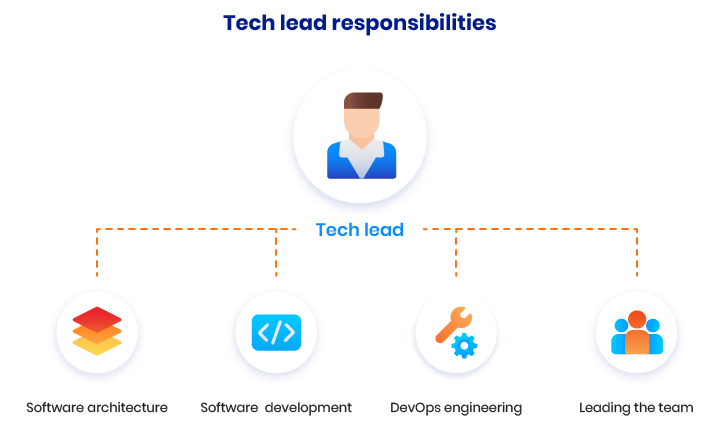
Building the software architecture
The tech lead is the key software architect in a technology startup. They:
- Design and implement a software architecture
- Choose a technology stack
- Design and configure infrastructure
- Pick a development toolkit (IDE, etc.)
- Design and implement a database
Software development
Before a tech startup gains momentum, a tech lead may be the only one writing the code. Therefore, they may need to:
- Develop and test an MVP
- Access and use APIs
- Manage third-party services
- Write software documentation
Leading the technical team
As a startup expands, the role of tech lead shifts toward leading the development team. At this point, the tech lead needs to:
- Hire a team
- Decompose tasks for developers
- Plan sprints
- Control product and code quality
- Organize the development process with Agile methodologies
- Review and improve the team’s performance
DevOps engineering
A tech lead needs to be a skilled DevOps engineer and establish a DevOps culture.
They should be able to:
- Set up a streamlined deployment pipeline
- Plan and carry out safe and downtime-proof software releases
- Manage releases, tags, and versions
A tech lead needs to have strong expertise in both software development and operational management. Skills in advanced technologies are a must.
Key tech lead hard skills
In terms of hard skills, a tech lead should have:
- Broad experience across multiple programming languages (a tech lead is often a full-stack developer)
- Experience designing complex architectures
- Knowledge of database architecture and design (relational, key–value, document-oriented, full-text, etc.)
- Experience selecting technology stacks, libraries, and integrations as well as designing APIs
- Experience forming deployment and Git flows
- Experience auditing code and defining technical KPIs and metrics
Key tech lead soft skills
The required soft skills for a tech lead include:
- Leadership and communication. Being a tech lead requires not only excellent coding skills but also good leadership skills. A tech lead needs to manage the team in a way that allows for delivering the product quickly and effectively.
- Effective decision-making. A tech lead has to make important decisions about new technologies and allocating resources to carry out projects.
- Business expertise. When a tech lead becomes a senior executive, they need not only technical expertise but also strong knowledge of how a tech business operates.
- Strategic management. As your startup expands, the tech lead starts to have more management-related responsibilities and can contribute to strategic planning or company management.
3. UI/UX designer
Position overview
A UI/UX designer is responsible for how users experience and interact with the product as well as for its look and feel.
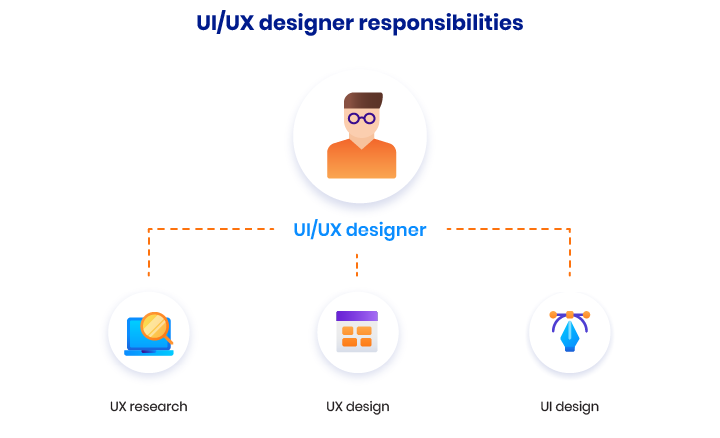
UX research
User experience research is a core part of a designer’s activity, helping them define the scope of the project and its goals. A UX designer:
- Researches target users
- Performs UX competitor analysis
- Analyzes market best practices
UX design
The ultimate goal of a UX designer is to develop a complete set of product UX prototypes that will form the basis of the product’s UI solution. The responsibilities of the UX designer include:
- Designing a product sitemap (page hierarchy, dependencies, content)
- Creating user flows (the paths taken by a typical user on a website or app to complete a task)
- Developing wireframes and creating UX prototypes
- Conducting concept and usability testing and gathering feedback
UI design
A UI/UX designer develops a complete set of UX prototypes that will form the basis of the product’s user interface. A UI designer:
- Develops and implements a moodboard and the UI concept
- Creates the UI mockup
- Designs specifications and develops a component library
Key UI/UX designer hard skills
- Understanding of the software development fundamentals.
- Agile methodology. A UI/UX designer should be able to work according to an agile methodology.
- Knowing the design guidelines (depending on the platform you choose).
- Knowing responsive design (if you are building a web app)
- Awareness of current design trends
- Experience with UX research and associated tools
- Experience with wireframing and associated tools
- Prototyping tools (Studio, Proto.io, Marvel, Origami)
- Familiarity with cognitive and behavioral psychology
- Experience creating moodboards
- Experience with UI design tools (Sketch, Figma, Adobe XD)
- Knowing the Heuristic evaluation method.
Key UI/UX designer soft skills
- Design thinking. According to Gartner, this is one of the skills seeing the greatest growth in demand. Design thinking helps people delve deep into customer needs and approach problems from a human perspective.
- Problem solving. Creating a user experience is directly aligned to a designer’s ability to effectively solve problems.
- Communication. Good communication skills help designers create and improve a product with ease as well as present their ideas and suggestions in a clear and concise way.
4. Software developer
Position overview
The software developer is the one who actually creates the product solution.
Often, startup owners look for full-stack developers instead of hiring separate frontend and backend software developers. At some startups, though, the tech lead is the only software developer.
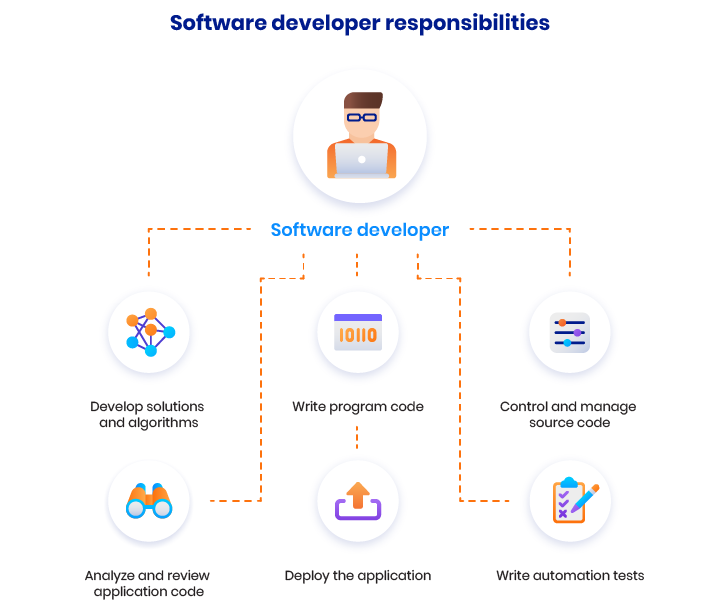
A startup software developer:
- Develops solutions and algorithms according to product requirements
- Writes program code according to the app architecture
- Controls and manages the source code using Git and GitHub
- Analyzes and reviews application code
- Writes automation tests
- Deploys the application to staging and production servers
Key hard skills for a software developer
The skills required from a software developer in a startup vary depending on the tech stack you choose. Here’s a general set of skills:
- SDLC fundamentals. A software developer should be familiar with various data structures and algorithms.
- Knowledge of the tech stack. A software developer must know the programming languages, frameworks, libraries, and tools necessary to build the product.
- Experience with relational and non-relational databases
- Experience with version control systems
- Experience with test-driven development, software debugging, and software testing
- Experience in cloud deployment and migration across multiple platforms.
Key soft skills for a software developer
- Teamwork. Embracing teamwork helps you build your product more efficiently. Being a team player also encourages creativity, leverages skills, and drives ownership of work.
- Time management. Managing time allows a developer to focus on what’s most essential and get tasks done in the fastest manner possible so the product release happens on time.
- Agility. In a startup, a developer should be prepared for changing requirements or projects at any time and should always be ready to incorporate feedback into the product.
5. Quality assurance engineer
Position overview
From requirements testing at the software design stage to final testing at the release and deployment stage, the role of a QA engineer is to perform full-cycle testing services.
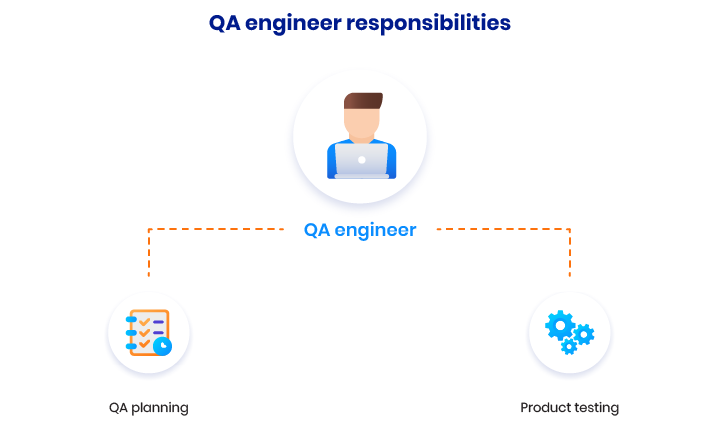
QA planning
The first task of a QA engineer is to estimate, prioritize, and plan testing activities. The QA engineer:
- Sets up a work environment
- Determines testing approaches and practices
- Selects the QA workflow
- Prepares the product’s test plan
Product testing
The QA engineer conducts quality and assurance testing of the developed solution. As soon as the front end of the product (or particular features) is ready and the product is deployed on the test (or staging) environment, the QA engineer performs the following activities:
- Regression and performance testing
- Product environment testing
- Automation testing
Upon testing, a QA engineer:
- Creates quality bug reports
- Assigns bugs to developers
- Performs bug retesting
Key hard skills for a QA engineer
- Experience in web and/or mobile testing (depending on the type of product)
- Knowledge of basic programming concepts and languages, including HTML and CSS
- Experience with continuous integration using tools like CircleCI, Jenkins, Maven, and Git
- Knowledge of modern best practices for quality assurance and test management
- Experience creating test plans and checklists
- Keenness about test design techniques
Key soft skills for a QA engineer
- Critical thinking. A QA engineer should have analysis, communication, interpretation, and problem-solving skills. Critical thinking is the ability to see the facts more clearly than false assumptions.
- Accuracy and precision. Objective evaluation of software and the ability to come up with exact recommendations for improving it are key skills for preventing bugs and improving product performance.
- Analytical skills. To figure out what’s wrong when something doesn’t work, a QA engineer must be a rational thinker yet creative and insightful. Analytical and problem-solving skills as well as outside-the-box thinking are essential.
Conclusion
In the early days of your startup, you may try to do everything yourself. With time, however, you might need to bring other team members on board.
While startup CEOs often take on the product manager role, a separate technical lead is usually needed to take care of the technical part of the product. At the same time, UI/UX designers, software developers, and QA engineers can actually build your product.
Knowing about these five startup company roles and responsibilities will help you distribute tasks between your team members effectively so everyone performs their job smoothly and you can successfully bring your product to market.
FAQ
-
The key roles in a tech startup include:
- Product manager, who is primarily responsible for customer development and product development
- Technical lead, who takes responsibility for the technical part of a product
- UI/UX designer, who is responsible for how users experience and interact with the product as well as for its look and feel
- Software developer, who actually creates the product solution
- QA engineer, whose key role is to perform full-cycle testing services
-
With the primary goal of a product manager being customer development and product development, the role of the product manager changes depending on the stage of the startup. A product manager’s responsibilities include:
- Defining the product vision and strategy
- Performing product discovery
- Carrying out ideation and business analysis
- Designing the product and approving its design
- Supervising product development
-
A startup CTO should have strong expertise in both software development and operational management.
Necessary hard skills include:
- Broad experience across multiple programming languages
- Experience designing complex architectures
- Knowledge of database architecture and design
- Experience in technology stack and library selection, integrations selection, and API design
- Experience forming deployment flows and Git flows
- Experience with code audits, technical KPIs, and metrics definition
RubyGarage can take responsibility for all tasks handled by a CTO and guide your tech startup to a successful launch. Share your business idea with us.



